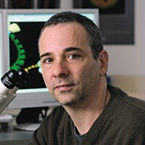
Dr. Nussenzweig is chief of the Laboratory of Genome Integrity at the National Institutes of Health. His laboratory is focused on the exploration of the causes and consequences of genomic instability, mechanisms of DNA repair, and the study of DNA repair breakdown as an initiating or protective event in aging and cancer. Seminal discoveries from his lab include the demonstration of why BRCA 1/2 deficient cancers frequently acquire chemoresistance, and the establishment of the essentiality of the non-homologous end joining DNA repair pathway in maintaining genomic stability.
Dr. Nussenzweig received his bachelor’s degree in physics from New York University and his doctoral degree in physics from Yale. He went to the De Spectroscopie Hertzienne De l’Ecole Normale Superieure in France, and to Memorial Sloan Kettering Cancer Center to pursue his postdoctoral training. He started at the NIH as a senior investigator in the Experimental Immunology, where he rose up the ranks, until he was promoted to branch chief in 2011. He has been given the title of “NIH distinguished investigator” in 2016.